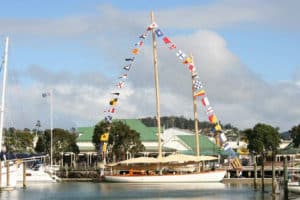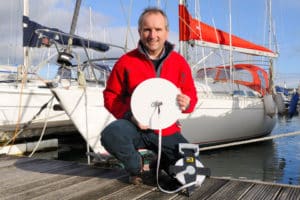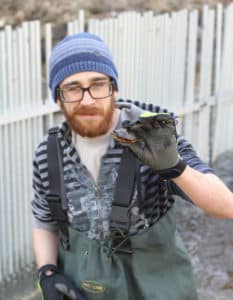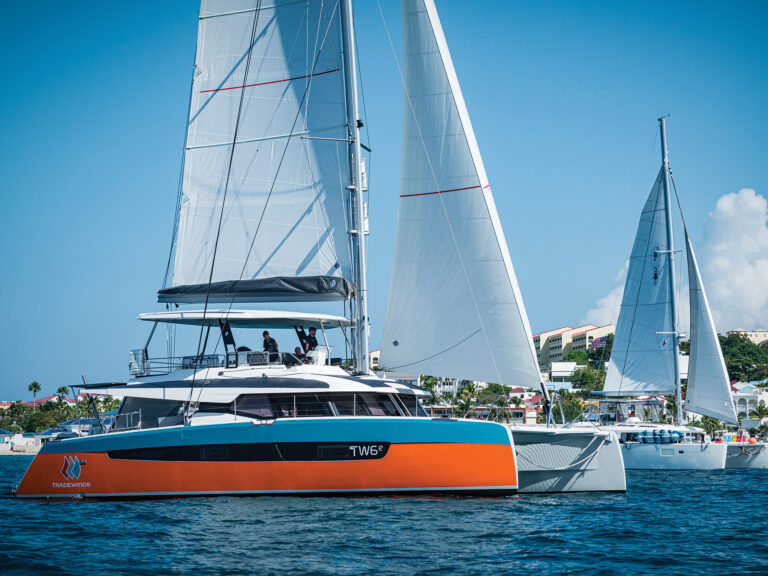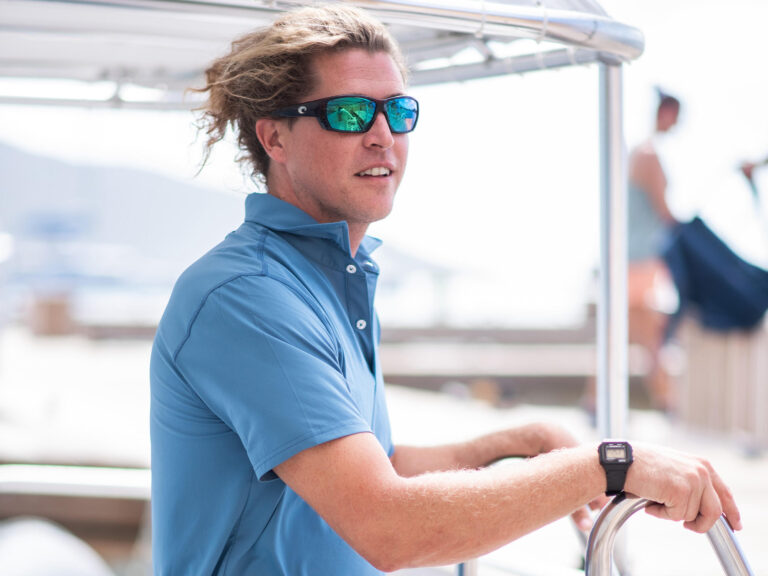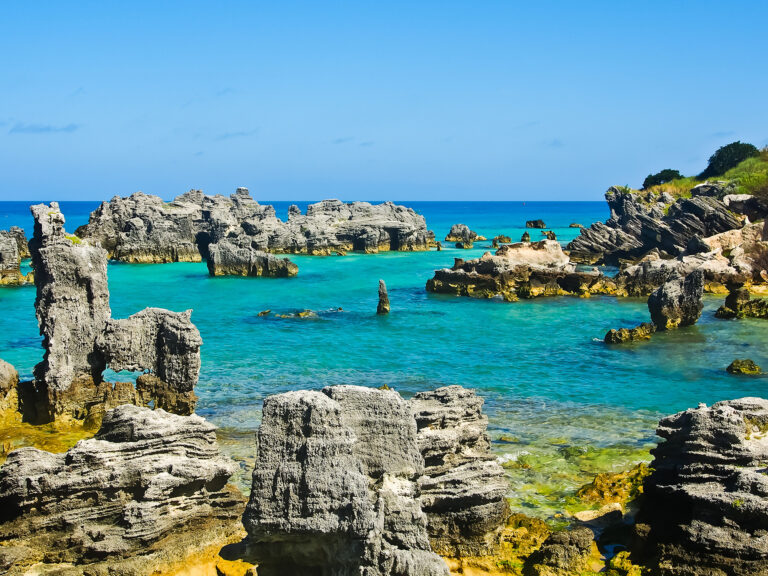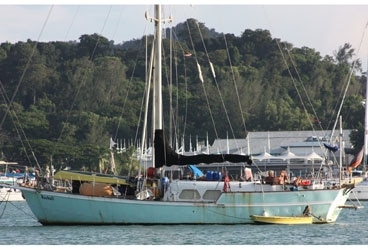
cruel twist 368
Sabine Metz of Berlin tries to smile, but I can see that it takes an effort. She can only hold the expression for a moment. We’re sitting in the cockpit of a rusty hulk of what was once a fine yacht; it’s anchored in Langkawi, Malaysia. Her face is pinched. Dark clouds flicker across her countenance. I can see horror, pain, and hatred. It’s as if a horrible television show is replaying itself on the inside of her eyelids-and she wants the visions to go away. Her expression makes me uneasy and nervous. However, if any sailor has a right to hate, it’s Sabine.
“The world is not a good place,” she says in a thick German accent. “They are animals.”
I don’t ask any questions. I don’t pry. I just sit and I listen and I think, “Poor dear. I hope I never have to see what’s reflected in those sad eyes.”
“You’re very brave,” I tell her at one point. She says nothing, but she juts her chin out proudly.
Her husband, Jurgen Kanter, isn’t quite as shattered. He’s more amazed, as if what happened to them can’t be true, but yet, somehow, it is. He keeps glancing around the deck of his ruined boat-at the broken boom, at the shattered dinghy, at all the rusty holes where important stuff used to be. He blinks his watery eyes and shakes his head in disbelief.
“They cooked food-rice and fish they caught-over an open fire on our aft deck,” he said. “They wouldn’t use the galley stove. We tried to show them. They refused. When the cooking fire would get low, they’d simply stroll down into Rockall’s interior and crowbar off another piece of varnished mahogany. They literally burnt my vessel’s interior before our eyes.”
Jurgen and Sabine aren’t new to cruising. They’ve been living aboard for over 30 years and have crossed the Indian Ocean four times. “Never a problem,” says Sabine.
“You always think that such a terrible thing will happen to the other guy, ” says Jurgen. “We have much good luck. Most people are very nice. Then one day, we have bad luck. Very. Bad. Luck.”
I’m not a trained investigative journalist. It’s difficult to confirm all the details that follow without speaking with the pirates or the German government, especially since I’m at sea as I hastily write these words. But I believe that Jurgen and Sabine’s account is substantially true. They tell me that they were sailing 15 miles off the coast of Yemen on June 23, 2008, heading from the Med to Thailand. What turned out to be the mother ship of the pirates looked just like the other fishing boats. The two fast vessels it launched didn’t head directly for them. They seemed to be fishing. Everything was OK. It was light air, the sea was flat, and Rockall was barely moving. Suddenly, there was a roar. Jurgen looked up. Both boats were approaching fast from opposite stern quarters with gunmen on their bows. There was an impact, a crash, and strange shouting. Four heavily armed pirates stumbled aboard on the port side at the same time that five more boarded from starboard. Sabine didn’t even have time to call a Mayday on the VHF.
It was the beginning of a yearlong nightmare that would nearly cost them their lives.
“I tell them my diesel don’t work,” says Jurgen. “And fix it so it won’t. They try but can’t start the engine. I know there are many warships all around us. For two and a half days, we sit there drifting, a yacht with the pirate mother ship and two large, fast boats being towed astern. I think for sure that one of the Western coalition ships will see us, but this didn’t happen. On the third day, they begin towing us toward Somalia. I think they’re fools. Surely, we’ll be rescued as they tow us across the wide safety lanes demarcated by NATO and the Horn of Africa naval forces. But the pirates don’t seem in the least worried-they’re having too much fun looting the boat. Then we see the coast of Somaliland and know we’re in for a long, long ordeal.”
Just before they’re taken off Rockall, Jurgen shoves a portable GPS down his pants and tapes it to his inner thigh.
On the beach, things go from bad to worse. The air is thick with violence. Other pirate groups want to wrestle Jurgen and Sabine away from their pirates. Everyone is armed to the teeth, and everyone is high on drugs, mostly khat. Jurgen can almost taste the blood in the air. The Somalis are shouting at each other, pointing weapons, beating on their sweating chests. Just off the beach, Rockall is being swarmed by looters.
“What a mess,” says Sabine.
They’re dragged up in the mountains and forced to sleep on the dirt for almost two months. They move constantly so the other marauding pirates can’t find them. Every so often, a mobile phone is thrust at Jurgen’s mouth. He assures the pirates that he’s begging for his life, but he gives the German government his exact GPS coordinates, how many teenager pirates are guarding him, where a good place to land an assault helicopter would be. He does this many times. “Come and shoot them,” he pleads. “Kill them all.”
Nothing happens.
The young pirates want to execute them. They only get the equivalent of US$500 if the demanded ransom, the equivalent of US$2 million, is paid. Meanwhile, they can’t go back to sea for more fun and profit while having to guard their boring captives. The older, wiser pirates-who get paid the equivalent of US$1,500 each if a payment is delivered-dissuade their younger coworkers with vague promises of distant profits, but only barely. This scene is replayed many times, with Sabine and Jurgen often angrily or flippantly tossing in their two cents’ worth.
The young pirates grow more hostile, more threatening. “You first,” they grin at Jurgen, then slide their eyes to Sabine.
At one point Jurgen loses control of his tongue and says, “I hope they bomb us all right now.”
Jurgen doesn’t believe that governments should pay piracy ransoms. He thought, and still thinks, that it results in more piracy. But he wants to live. He wants Sabine to live. He learns that his boat has been wrestled away from the pirates by the Somali government, and it’s a small ray of distant hope.
One day, 52 days after their capture, everyone is grinning, even the teenagers. Jurgen and Sabine are whisked away to a waiting private jet. It’s surreal. Everything is happening very fast. Jurgen doesn’t want to go back to Germany; he wants to find his boat. He refuses to leave, but he’s told again and again that his boat is lost, gone, destroyed-and that he must return to Germany.
He’s ordered by a dismayed German government to return, and though he pleads otherwise, eventually he does.
The official government line is that they don’t pay ransoms, but someone or some organization came up with either US$600,000 or 1.5 million euros, depending on which ransom rumor you believe.
Jurgen had sailed away from Germany 32 years earlier and no longer had friends there. And it turns out that he isn’t the grateful poster boy who’d champion ransom payments or pirate appeasement, as some folks had hoped. Far from it.
Once back in Europe, Jurgen says things that aren’t PC. Television cameras whirl. The government isn’t happy. Jurgen isn’t happy. His boat is gone. Ten times the exasperated government tells him this. But Jurgen borrows cellphones and calls all over Somalia. He calls pirates and expat Germans and the corrupt police and local fishermen. He discovers that his boat is afloat and at anchor in Berbera, Somaliland, with food still being cooked outdoors on the aft deck.
This angers the 62-year-old Jurgen. He can’t bear the thought of his boat in Somali hands, even though it now has no engine, no generator, no boom, no sails, no nutt’n.
Rockall is steel, built for Antarctic exploration. She’s been Jurgen’s home for over 20 years. Jurgen knows what it feels like to be abandoned. He can’t and won’t abandon his vessel. Home is home.
Besides, he’s homeless and penniless. His boat is his castle. He can’t give her up. He can’t let it go.
So what does he do? Jurgen hops on an airplane. He takes a bus. He hitchhikes. He hires guards and a taxi. He walks and walks. He knows there’ll be no princely ransom saving him this time; he knows that this time, the German government will say “Keep him!” And it’ll mean it.
Finally, he’s walking down a hot, dusty beach road leading to a tiny Somaliland harbor where Rockall is nuzzling her anchor. Jurgen is determined. He’s also seething. There’s a man walking down the street and turning to enter a restaurant. Jurgen runs over and begins clawing the shirt off his back. “That’s my shirt!” screams Jurgen in rage. “No!” cries the man. “I bought it from the police!”
“Mine!” shouts Jurgen. He walks outside, and right there mocking him in the backyard of a local house are his sheets and his pillow cases off Rockall. He collects those, too. A woman comes out. There’s a tug-of-war. People are shouting and running. The police arrive and arrest him for being in the country illegally, which, in a strict sense, he is.
“You’re no different than the pirates!” he yells at the astounded cops.
But mere bars can’t hold Jurgen now. He’s spitting fire, taking down names, and kicking butt. The sight of his waiting vessel has empowered him. He gets released and rushes down to what’s left of his boat. There’s only a hole where the engine used to be. He dashes back ashore and finds an ancient truck with a diesel engine and makes a hasty deal. He tosses the too-huge engine into the boat, calls up Sabine, and says, “Ready!”
Almost a year has passed since their capture. Sabine comes from Germany, via Eritrea, and sneaks aboard, shaking like a leaf; they plan to leave at dawn. But a storm is brewing, and it’s a bad one. The large radio tower right next to their boat sways and sways and buckles and falls directly on the damage-weary Rockall.
“I thought we’d been bombed,” admits Sabine. “So much bad luck, no?”
The metal deck has been ruptured in four places, and, of course, Jurgen’s welding equipment was looted long ago. But nothing can stop Jurgen now. And, yes, he’s angry, angry, angry with the gods. He works both day and night, like a man possessed. A few weeks later, under storm trysail and torn and tattered staysail, Jurgen and Sabine sail out of Somaliland. They’re free. They’ve won.
About five months and 3,000 ocean miles later, they just happen to anchor next to my Wild Card in Langkawi. Rockall looks like, well, a bit untidy. I row over. We become friends. I give them a few pennies and some spare tools; mostly I give them a shoulder to cry on.
Then Jurgen gets a message: The German government is frantically attempting to contact him. He dashes ashore but soon returns. He’s stunned.
“They want the equivalent of US$26,000 each,” he says. We don’t understand. He elaborates: “The bill. For the private jet to carry us back to Germany. A total of US$52,000. Wow!”
I look at his slack face. He can’t seem to decide whether to laugh or to cry. Sabine twists away, clenching her tiny fists into angry balls. I just stare at the ground.
Cap’n Fatty and Carolyn Goodlander should be arriving in Oman and gathering together a convoy of five boats that will travel-under power, for stealth-100 yards abreast for a run to Aden,
in Yemen.

